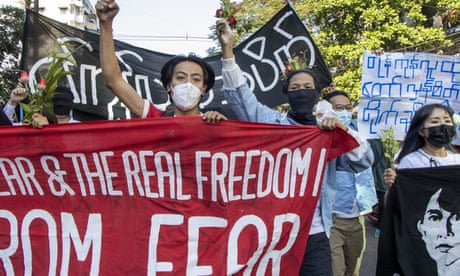- by foxnews
- 07 Apr 2025
?Do or die?: Myanmar?s junta may have stirred up a hornets? nest
‘Do or die’: Myanmar’s junta may have stirred up a hornets’ nest
- by theguardian
- 07 Dec 2021
- in news

On Sunday morning, a small group of protesters walked together in Kyimyindaing township, Yangon, waving bunches of eugenia and roses. They carried a banner reading: "The only real prison is fear and the real freedom is freedom from fear".
The words are famously those of ousted leader Aung San Suu Kyi, whose sentencing by the junta to two years in detention was announced on Monday.
Minutes after they had gathered, witnesses told local media that a military vehicle rammed into the group. At least five people were killed, according to independent outlet Myanmar Now. Those who survived were arrested - some of the latest of more than 10,700 people to be detained since the February coup.
Almost a year has passed since the military seized power in Myanmar. Yet despite the generals arresting thousands, including the country's elected leaders, and unleashing terror across the country, opposition to the junta remains widespread.
A civil disobedience movement continues to hold small, peaceful flashmob-style protests, while armed groups carry out guerrilla ambushes across the country. Young people have fled to the jungle to train and communities have taken up arms to defend their areas, at times in alliance with existing resistance organisations drawn from ethnic groups in conflict with the military.
The military, Mathieson added, has most likely been taken aback by the scale of opposition. "They must be thinking, what kind of hornets' nest have we stirred here? It has fought for decades against ethnic armed organisations. Now they are now facing normal people, who a year ago wouldn't have countenanced an armed revolt at all."
Dr Sasa, spokesperson for the exiled opposition National Unity Government (NUG), said the public had no choice but to defend itself. "[The military] are not only destroying our democracy and freedom, but they are destroying every day our dignity as human beings. It's, like, do or die."
Such people's defence forces, whose numbers Sasa did not specify, could stretch the army's resources more thinly across the country, but analysts say they currently lack coordination. Some have pledged allegiance to the NUG, which was formed by elected lawmakers and declared a defensive war in September, while others have allied with ethnic armed organisations, or both. Some operate autonomously.
The NUG has produced ethical guidelines for such groups, though the level of control it has over various groups is unclear. "I don't think they have anywhere near as much coordination as they claim to have," said Mathieson. The guerrilla tactics used against the military include assassinations of its officials, bombing military property and sabotaging infrastructure such as telecom towers and bridges.
The NUG claims that almost 3,000 junta troops have died in fighting between June and November, and that 8,000 military and police personnel have defected. The junta says 75 soldiers and 93 members of the police were killed between February and late October, according to data quoted by AFP.
Such figures should be treated with caution, said Mathieson. While Myanmar's generals were surprised by the rapid formation of opposition defence forces, they are facing the second largest army in south-east Asia, which is supplied by China and Russia. Established insurgent groups are financed by illegal drug and jade trades, but newer ones lack the same financial clout and supply of weapons.
An arms dealer interviewed by Agence France-Presse said that, as Myanmar's kyat currency has plunged in the aftermath of the coup, the cost of weapons has risen sharply. In March-April, one M-16 rifle cost about 4m kyat ($2,247), while an AK-47 cost 5m kyat; now the cost has almost doubled, forcing fighters to rely on homemade guns and donations.
Away from the training camps for anti-coup recruits, communities find ways to resist. Many refuse to pay their electricity bills, cutting off income to a state-backed power company. Companies that are aligned with the military are shunned. A popular Myanmar shopping mall, Myanmar Plaza, is facing a mass boycott, after its security staff struck young students who were staging a protest.
Orders announced by the military are ignored. In Yangon, some residents hand out free face masks in defiance of military rules that forbid the wearing of face coverings near where soldiers are stationed.
Flashmobs continue to be held, despite the constant risk of military violence. On Sunday night in Yangon, the clanging of metal could be heard across the streets. From their homes, residents banged pots and pans to protest against the military, and to honour the lives of protesters killed that morning.
Chris Sidoti, of the Special Advisory Council for Myanmar, said the country was likely to descend into a protracted conflict unless pressure was placed on the military to negotiate. "The democratic movement is determined this time. It will not stand down, it will not give up," he said. The international community should cut off cash and arms, he said, and make greater use of non-military channels to deliver aid. According to the UN, about 3 million people require life-saving assistance.
- by foxnews
- descember 09, 2016
Ancient Ten Commandments fragment of 2,000-year-old manuscript to go on display at Reagan Library
The "Dead Sea Scrolls" exhibit, announced at the Ronald Reagan Presidential Library and Museum, features ancient Jewish manuscripts, plus the rarely seen Ten Commandments Scroll.
read more


